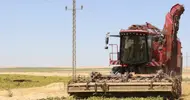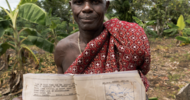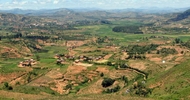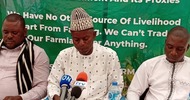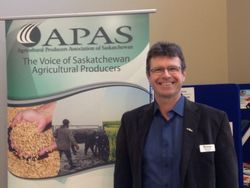
There has been individuals purchasing land on spec and driving the prices even faster and there’s been a cry from the farming community,” says Norm Hall, president of the Agricultural Producers of Saskatchewan.
Farmers’ organizations want clearer rules on farmland ownership in provinces
By DENIS CALNAN |
While new interest in protecting farmland in Saskatchewan has been sparked, farmers’ organizations say more study is needed to understand who owns what farmland and what the various rules are governing ownership in the provinces, in order to form future rules.
“Farming has been getting better and land value has been going up. There has been individuals purchasing land on spec and driving the prices even faster and there’s been a cry from the farming community,” said Norm Hall, president of the Agricultural Producers of Saskatchewan.
The Canada Pension Plan Investment Board bought 115,000 acres of farmland in Saskatchewan “and intended to make further purchases,” according to its website. The reaction from farmers in the province was anger because they felt it was their own money, through their contributions to the CPP, driving up the price of farmland, according to Mr. Hall.
“We have to compete against our own money,” said Mr. Hall. “And what’s being invested there is pre-tax dollars and farmers have to try and compete with that with post-tax dollars.
“And so there was a push from the farming community and it was taken up by the leader of the conservative party here in Saskatchewan and the province picked it up,” said Mr. Hall.
Now the provincial government is reportedly looking at altering the rules to ensure farmers have a fair chance to buy farmland at an affordable rate, without competing against large institutions like the CPPIB.
The trend of large institutional investment groups, like pension plans, is not new globally, but Scott Ross, director of business risk management and farm policy at the Canadian Federation of Agriculture, said in Canada it is somewhat new.
“In Canada the interest has been relatively recent. And I think it speaks largely to a lot of the optimism that you’ve seen in agriculture over the past decade,” said Mr. Ross.
“There’s been a real attitude shift, I think, in Canadian agriculture. Where recently we’ve seen some high commodity prices and there’s recognition that because of emerging market growth in a lot of parts of the world, [combined with] Canada’s large natural resources base, there’s a lot of opportunity in this sector long term. The fundamentals are very strong. There’s a good foundation here and I think that’s led to some attractiveness,” he said.
Also the Saskatchewan government had made it easier for Canadians outside of Saskatchewan to buy farmland in the province.
“[Agriculture] is a very long-term, stable source of income. And if you look back at what some of the returns on farmland appreciation has been over the last ten years. It’s been significant and very stable.”
Mr. Ross said more information and analysis are needed in this sector, something the federation is starting to look at.
“What we really lack is a comprehensive overview of what’s happening across the country,” said Mr. Ross.
“Major one-off purchases, like the Canada Pension Plan, get a lot of attention, but from a systemic level it’s very hard to get that kind of information as to how much land is owned by, let’s say, private investors, versus the farmers that are actually on the land,” he said.
“It’s a very tricky subject to actually get any information on. I mean, people often look at corporate ownership and farm corporations. Many farms in Canada now—I think the majority—are incorporated. So there’s not really an easy metric you can use, from an operating arrangement structure, to look at that. And short of surveying every producer in Canada, and hoping that in some respect they give you a detailed account, it’s a very tricky [thing] to get an understanding of,” said Mr. Ross.
The federation said it wants to find ways to have private equity investing in the sector that suits long-term objectives for farmers and not raise the cost of farmland for farmers.
“We don’t want to discourage investment in the sector. We just have to find ways that makes sense for farmers and don’t raise farm access concerns long-term,” said Mr. Ross.
The federation’s investigations into private equity and access to land are something the organization is just starting to bite into now.
“It’s an ongoing issue and I don’t think there’s a one clear policy on this we have at the moment. And we’re kind of grappling with the issue,” said Mr. Ross.



